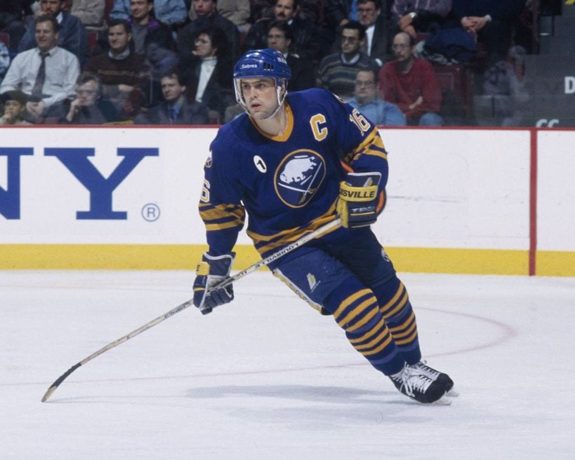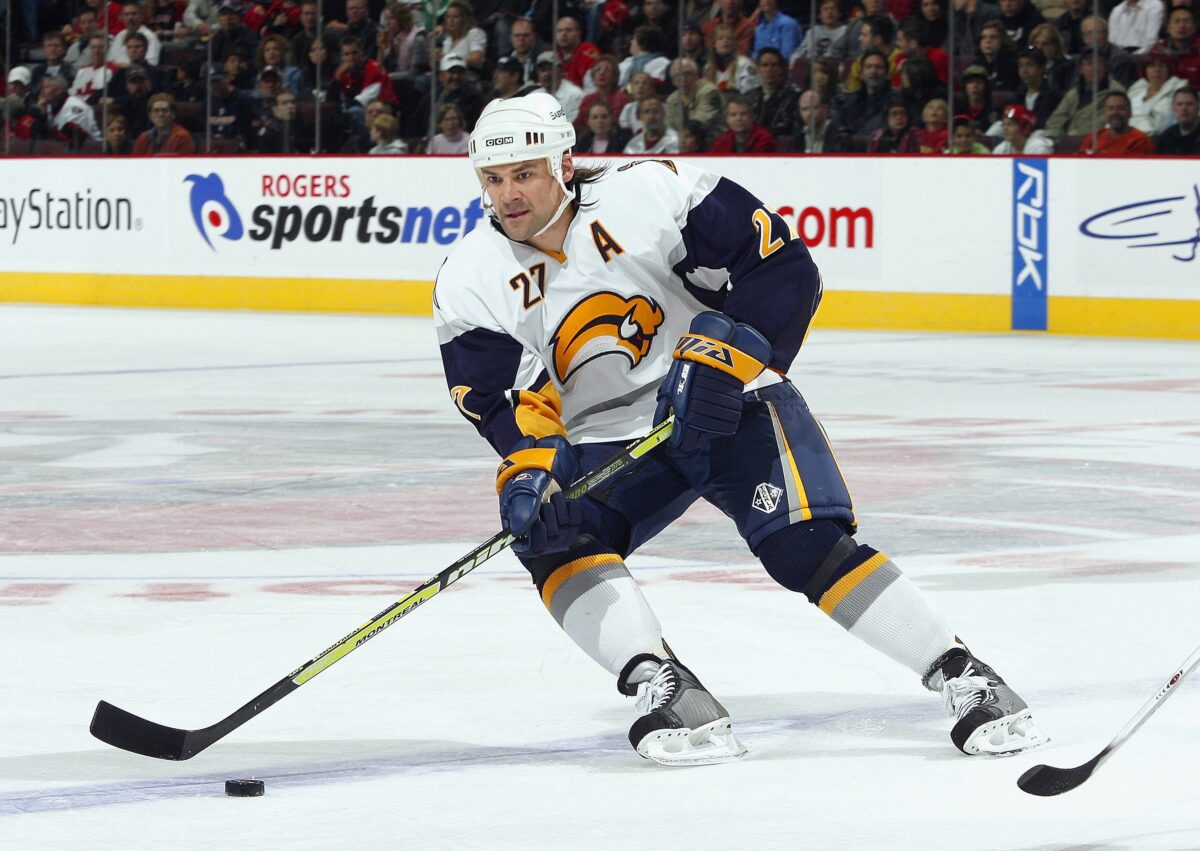There’s no greater question in all of sports than “what if?” Regardless of whether it was in football, baseball or NASCAR, it’s something that gets asked repeatedly and lends a great deal to the mystique of every sport.
So, it should come as no surprise that there’s been quite a few “what ifs” in hockey over the years. What if Wayne Gretzky had never left the Edmonton Oilers? What if the NHL had folded in the 1970s instead of the World Hockey Association? What if the NHL had expanded less into the United States and more into Canada?
And, since the Buffalo Sabres have never won a Stanley Cup to date despite a number of near misses, there’s quite a few what ifs for them as well. Keeping the list narrow would be a tall task, but here are some of the more notable ones.
What If: Buffalo Hadn’t Won The Spin?
The Sabres have had mixed results when it comes to the NHL Draft Lottery in recent years. Given that, it might be easy to forget that they did win the first ever draft lottery they participated in (albeit it was only between two teams). As many fans know, when the Sabres and Vancouver Canucks entered the NHL in 1970, the league allowed the two a spin of a roulette wheel to determine whom would get the first-overall selection of the draft. The Sabres won, selected the coveted Quebecois phenom Gilbert Perreault, and the rest is history. But what if the Canucks had won?
Latest THW Headlines
If the spin had gone differently, the trajectory of professional hockey in Buffalo may have been radically different. Dale Tallon was believed to be the second-best player available and the Sabres likely would have selected him like the Canucks did. Tallon went on to have a solid career for himself but Vancouver received nowhere near the same level of contributions from him as Buffalo did from Perreault, and there’s simply no comparing the two.
Perreault was the cornerstone of the Sabres from the moment he first put on their jersey and was the foundation on which the franchise built itself, as his sensational offensive abilities gave the team an immediately viable threat. The French Connection line was the biggest reason for the Sabres’ rapid rise to legitimacy in the 1970s and was one of the greatest trios of the decade. If Perreault had never been drafted, Rick Martin and Rene Robert wouldn’t have found a centerman who matched them so naturally and it’s hard to imagine anyone else between them.
Without the French Connection, the Sabres may not have taken off in the 1974-75 season and reached the Stanley Cup Final, which proved that young teams can grow up fast. Perreault led on and off the ice until his retirement in 1986 and he was the last member of the original team to depart. Without his contributions and longevity, the Sabres still may have found success, but there’s no questioning that they would probably look quite different today.
What If: LaFontaine Hadn’t Been Lost?
The mid-90s were a tough time for the Sabres despite the successes they found on the ice. Behind the scenes, founders Seymour and Northrup Knox encountered increasing financial hardships near the end of their tenure and it greatly reduced the amount they could spend on players. Superstar Alexander Mogilny had to be traded at the 1995 Draft simply because the team couldn’t afford to re-sign him. Though they acquired a star in return in Michael Peca, the move put the offensive weight of the team solely on the shoulders of Pat LaFontaine.
LaFontaine had no issue making up for Mogilny’s absence and scored 41 goals and 91 points in the 1995-96 season, but the script was soon flipped. Early in the 1996-97 campaign, the captain was concussed after a dirty, head-hunting hit by Pittsburgh’s Francois Leroux and developed post-concussion syndrome. It eventually ended his time in a Sabres’ uniform after he rejected the team medical staff’s recommendation that he retire. He was traded to the New York Rangers that offseason.

The Sabres did have other weapons that softened the blow slightly, but what if the injury had never occurred? They were one of the NHL’s youngest rosters at the time and LaFontaine’s presence as a leader was every bit as valuable as his play on the ice. With him still aboard, Peca and the soon-to-be acquired Miroslav Satan would have had considerably more protection in the lineup and might have broken out even bigger, making the team all the more dangerous. But there’s also a chance that the results wouldn’t have been as positive.
Related: Sabres Must Adapt to Devon Levi’s Struggles With Rebound Control
Had LaFontaine remained, the Sabres wouldn’t have had to make a major shift that eventually paid big dividends. Then-head coach Ted Nolan had no choice but to reorient his squad to a defensive style centered around megastar goaltender Dominik Hasek. Though it was far from glamorous, it proved to be very effective and propelled the team to the 1999 Stanley Cup Final. LaFontaine was invaluable to the Sabres and it would be impossible to argue against that, but his absence forced the team to adapt and it reached its greatest height to date as a result. Through no fault of his own, that might not have been the case had he stayed healthy.
What If: Buffalo Had Won The 2015 Draft Lottery?
April 18, 2015, stands out among the darker days in Buffalo hockey history. A tumultuous 2014-15 season saw the Sabres finish last in the NHL which guaranteed them the best odds to win that year’s draft lottery and receive the first-overall selection. The consensus was that the Sabres would win the lottery (literally and figuratively), giving them the right to draft Connor McDavid, the most-hyped prospect in some time. Fans awaited the moment with bated breath.
That excitement turned into fury when the Edmonton Oilers were revealed as the winner. The news was as well-received in Western New York as one would expect, especially since the Sabres had also lost the previous year’s lottery. Luckily for Buffalo, second-overall pick Jack Eichel was no small prize. The Hobey Baker winner was the piece around which the Sabres could have built a contender, but that didn’t happen. Eichel’s chances of taking the team to the next level were eradicated by executive meddling and he departed acrimoniously in 2021.

Would the results have been the same had Buffalo won the Draft Lottery? McDavid has established himself as the by and large best player of his generation and dazzled his way to three MVPs and five scoring titles. But would the Sabres’ constant turnover and organizational incompetence of the period have hindered him the same way? McDavid is without question a better player than Eichel and might have fared slightly better based purely on skill, but the Sabres have proven in the last decade that bad management can ruin even the best of players. Would he have been any different?
After all, the Oilers have proven with McDavid that one man can’t do it all. With the superhuman on board, Edmonton has had a couple of good runs of success but hasn’t been able to climb the mountain despite his jaw-dropping efforts. Given that, there’s no guarantee that he would have fared any better with the Sabres during what was the worst period of their history. Perhaps his tenure with them would have gone the same as Eichel’s.
What If: The Defense Stayed Healthy in 2006?
Buffalo came back to life when play resumed after the 2004-05 Lockout and shocked the hockey world in the process. After a fourth-place finish in the Eastern Conference and two stunning upsets in the playoffs, the Sabres found themselves in the Conference Final against the Carolina Hurricanes. However, they paid the price to get there and were decimated by injuries along the way. Four of their top six defensemen (Dmitri Kalinin, Henrik Tallinder, Teppo Numminen and Jay McKee) were sidelined by the time the series reached a seventh game.
As a result, then-head coach Lindy Ruff was forced to rely on backups and call-ups. To its credit, the makeshift unit performed commendably, but the injuries proved too much to overcome, and the Sabres suffered a heartbreaking loss. It remains a sore spot for fans nearly 20 years later and has become one of the biggest what-ifs in the pantheon of the team. What if the defense had stayed healthy? What if even three defenders had been lost rather than four? What if the biggest blow of all, losing McKee, hadn’t occurred before Game 7?

The Sabres were so successful coming out of the lockout because they had the perfect roster for the shifting landscape. They were young, fast, talented and buoyed by strong veteran leadership. They had the speed to out-skate the big, bad Philadelphia Flyers and an offensive onslaught that proved too much even for the mighty Ottawa Senators who finished with the second-most points in the NHL that season. In short, they were the real deal and didn’t begin to slow until after the injuries began to pile up.
Even with their ever-shrinking defense, the Sabres went toe-to-toe with the Hurricanes in the Conference Final and very nearly won Game 7 despite having three minor leaguer blueliners in the lineup. With their defense fully or even just slightly more intact, it’s fair to assume that Buffalo could have gone on to win the Stanley Cup. It looked to be the best opportunity the team had, but unfortunately, we’ll never know.
The list doesn’t even come close to ending there. Sabres fans have been tortured by countless what ifs over the years and we’re not even scratching the surface here. Check back later, there might be a part two coming!
